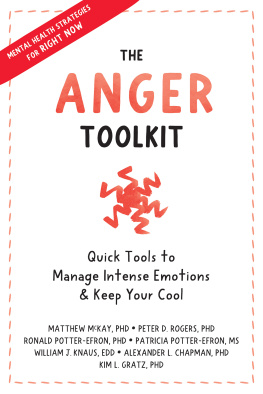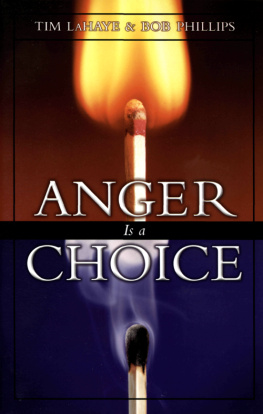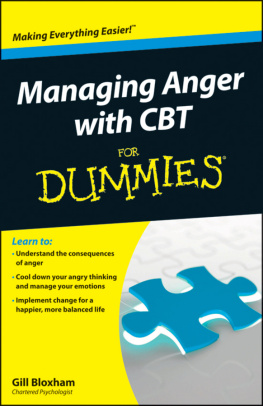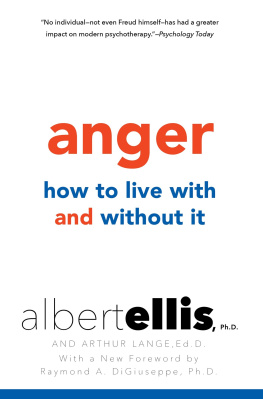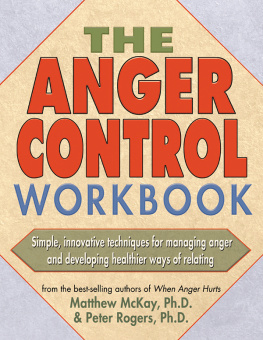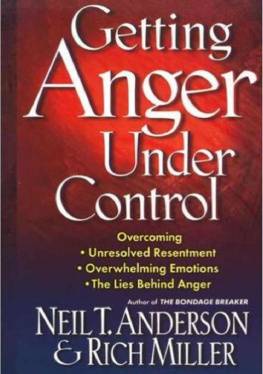Overcoming Destructive Anger
Overcoming Destructive Anger
Strategies That Work
BERNARD GOLDEN, PhD

This book is not meant to substitute for medical care of people with mental health disorders, and treatment should not be based solely on its contents. Instead, treatment must be developed in a dialogue between the individual and his or her physician. Our book has been written to help with that dialogue.
2016 Bernard Golden
All rights reserved. Published 2016
Printed in the United States of America on acid-free paper
987654321
Johns Hopkins University Press
2715 North Charles Street
Baltimore, Maryland 21218-4363
www.press.jhu.edu
Library of Congress Cataloging-in-Publication Data
Names: Golden, Bernard, author.
Title: Overcoming destructive anger : strategies that work / Bernard Golden.
Description: Baltimore : Johns Hopkins University Press, 2016. | Includes bibliographical references and index.
Identifiers: LCCN 2015031663| ISBN 9781421419732 (hardback) | ISBN 9781421419749 (paperback) | ISBN 9781421419756 (electronic) | ISBN 1421419734 (hardback) | ISBN 1421419742 (paperback) | ISBN 1421419750 (electronic)
Subjects: LCSH: Anger. | Emotional intelligence. | Emotion-focused therapy. | BISAC: HEALTH & FITNESS / General. | PSYCHOLOGY / General. | SELF-HELP / Anger Management (see also FAMILY & RELATIONSHIPS / Anger). | FAMILY & RELATIONSHIPS / Anger (see also SELF-HELP / Anger Management).
Classification: LCC BF575.A5 G65 2016 | DDC 152.4/7--dc23 LC record available at http://lccn.loc.gov/2015031663
A catalog record for this book is available from the British Library.
Special discounts are available for bulk purchases of this book. For more information, please contact Special Sales at 410-516-6936 or .
Johns Hopkins University Press uses environmentally friendly book materials, including recycled text paper that is composed of at least 30 percent post-consumer waste, whenever possible.
Contents
Preface
Anger is a highly charged emotion thats often difficult to understand. Destructive angerespecially if it has led to physical violencecan significantly strain relationships. By selecting this book, youve shown that you are well aware of its impact. Perhaps you blame your temper for a severed relationship with a family member, partner, or friend. Maybe your quickness to anger has caused you to lose a job or has endangered your career. Or, if you have children, your outbursts may have led them to withdraw from you in fear. Whatever the case may be, the greatest test when dealing with anger is to keep it from overwhelming you.
Few people have received instructions on how to manage anger constructively. As such, they often find it challenging. Regardless of how you currently handle your anger, Overcoming Destructive Anger: Strategies That Work will teach you the skills to address your challenges and answer your most trying questions. This book offers strategies to overcome anger that
is overly intense,
occurs frequently,
lasts a long time, and
is difficult to let go.
Overcoming Destructive Anger trains you to recognize and control the triggers that lead to anger. It will help you not only to overcome destructive anger but also to practice healthy anger on a regular basis. Youll learn how to react less to anger, how to identify the unmet needs and desires that contribute to your anger, and how to relate to others so that you more readily meet these needs and desires.
My enduring interest in anger as an adult has been influenced, in part, by my own difficulties with anger as a child. Fortunately, my anger never resulted in serious harm to anyone. However, I did find myself quick to anger on several occasions when it could have caused serious injury and pain to others.
On one occasion, when I was eight years old, I had an altercation with my older brother. At the time, we lived in an apartment on the second floor of a four-story building. We were home alone, and my brother had been teasing me about something. We began to wrestle with each other. He straddled my chest, held my hands to the floor, and pinned me down. I couldnt find the strength to get him off, so I yelled as loud as I could. To be honest, I intended to embarrass him by alerting the neighbors. After wrestling and screaming for a few more minutes, however, I gave up and shouted Uncle! and he finally released me.
I may have appeared calm on the outside, but inside, I was furious. As I slowly walked away, I grabbed the heaviest shoe I could find and threw it at my brothers head. With an enviable display of quick reflexes, he ducked. The shoe, however, continued its flight, shattering one of our living room windows and hitting the street belowalong with pieces of glass.
I remember immediately feeling ashamed. I had broken the window and destroyed the set of blinds that had covered it, and I feared that the shards of glass might have fallen on someone below. That particular window, you see, was right above the entrance to our building. When I looked out another window, I fully expected to see someone injured as a result of my impulsive anger. Luckily, no one was entering or leaving the building at that moment.
This was just one in a series of events that helped me recognize my difficulty with anger and how quickly I could move from feeling annoyed to experiencing rage. Fortunately, I was also both highly self-conscious and reflective. Perhaps these were early signs of my becoming a therapist.
I eventually vowed to better control my anger, but I usually ended up stifling and trying to ignore it. I had somehow concluded that I shouldnt show or even feel anger. As a result, my anger often escalated until Id verbally explode and take it out on the next person or situation to cause me additional grief.
Years later, as a young adult, I taught in an elementary school in the South Bronx. During my six years there, I became interested in better understanding the childrens anger as well as my own. I obtained my masters degree in psychology, then returned to school full-time for my doctoral degree. For several years afterward, I worked in a psychiatric inpatient setting. I developed workshops to help patients comprehend and control their anger. These early experiences helped me develop the approach I present in this book.
In the 1980s, I began offering workshops on anger management to schools, parents, and businesses, while working in both outpatient and inpatient settings. Ive offered monthly classes on anger management since 1994. Additionally, at my private practice, I focus on individual counseling and psychotherapy for the practice of healthy anger.
Overcoming Destructive Anger is for people of all ages. It offers exciting new approaches to anger management that have been developed since my 2003 book, Healthy Anger: How to Help Children and Teens Manage Their Anger, appeared. In the vignettes that accompany Overcoming Destructive Anger, people learn the causes of their anger and learn to apply the concepts in this book. The vignettes are based on some of my clients, though Ive changed certain details to maintain their anonymity. Exercises at the end of each chapter will help reinforce the material, enhance your self-awareness, and cultivate healthy anger.
You can learn specific attitudes and skills to effectively address the full range of your anger, from slight to highly intense. And while you may make significant progress in a relatively short time, creating meaningful change requires commitment and patience. It requires a certain level of
Next page


